Gypsy, Roma, Traveller & Showmen Voices heard loud and clear at Sites of Inclusion conference
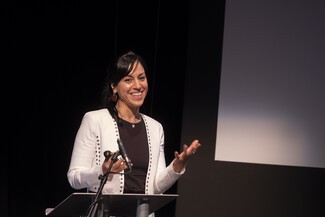
The Sites of Inclusion report from Romani Cultural & Arts Company highlights Arts Council Wales’ commitment to GRT Arts at The Riverfront Newport, Wales, October 23rd 2022
Sites of Inclusion is the most recent report into Gypsy, Roma and Traveller participation in the arts sector of Wales. The report is compiled by Dr Daniel Baker for the Romani Cultural & Arts Company, and commissioned by Arts Council Wales, specifically to gauge response from their portfolio of funded arts organisations into how they are including and encouraging GRT artists into their spaces and exhibition programming.
Introducing his findings to the audience, compiler of the report, artist and curator Dr Daniel Baker said; “By commissioning the Romani Cultural & Arts Company (RCAC) to carry out the research, the Arts Council of Wales (ACW) are recognising the need for a new approach to addressing inequality in the arts sector. This is a step that Arts Council England and Creative Scotland are yet to take in relation to GRT artists and GRT communities.”
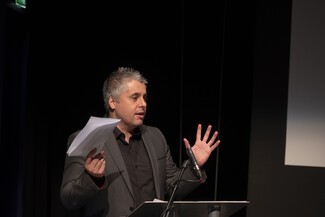
The conference was well-attended, and speakers included Dr Rosa Cisneros, Sheldon Chadwick (Founder of The Showmen’s Mental Health Awareness Charity), Councillor Jane Mudd (Newport City Council), Dr Jo Clement, Deputy Minister for Arts and Sport Dawn Bowen, Professor Emeritus in Romani Studies Thomas Acton, Gypsy Maker 5 Curator Dr Daniel Baker; hosted by RCAC Director Isaac Blake. Audience representation featured Wendy Callaghan, who is the Deaf-outreach advocate for Welsh Women’s Aid, Anne Evans of Art in the Attic, The Factory Porth, Tracey Harding of Art Central Barry, and representatives of Arts Council Wales (ACW).
Sheldon Chadwick, who’s powerful and moving talk focused on Showman inclusion and mental health, said; “I believe the best way to extend the outreach of the arts to GTRSB communities must be through the mediatory agents outlined in the (Sites of Inclusion) road map, who can operate across possible boundaries between communities and organisations. I also hope to see more roles and opportunities for members of the GTRSB communities within the arts organisations.”
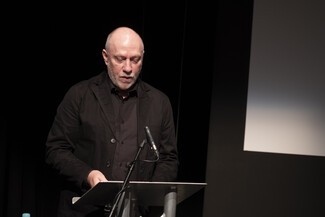
One of the starkest outcomes detailed in the report is that out of ACW’S portfolio of 67 funded arts organisations across Wales, only 20 completed the survey to be included in this milestone national report, despite being given multiple prompts to participate. Speaker Dr Jo Clement noted;
“The most damning find in this revelatory report is that less than 1% of Welsh Arts Council-funded organisations utilise their budget to involve Gypsy, Roma and Traveller people across their operations. More than 70% of the organisations contacted did not deem it worthwhile to respond. How is this in keeping with Arts Council Wales' strategy for collaboration, inclusivity and growth? This begs a moment of deep reflection.”
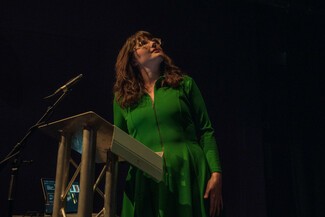
The reasons for this lack of engagement are unclear, but may be due to a term used by Dr Daniel Baker, “passive openness”. That is where organisations present as open to diversity and inclusion yet fail to action meaningful steps of engagement. Participation in this ground-breaking report will have been a significant missed opportunity for these absent organisations within Arts Council Wales portfolio.
Dr Jo Clement adds; “I strongly suspect that similar statistics await us from organisations in receipt of Arts Council funding in England and Northern Ireland, as well as those supported by Creative Scotland. The organisations who did respond have shown that they are not only failing to integrate Gypsy, Roma and Travellers in their public audiences but that we are also excluded from their staffing and artistic commissions, ignoring the local and global relevance of our artists and makers. Across the board, this reveals a severely disappointing lack of acknowledgement for the many talents Gypsy, Roma and Traveller people possess.”
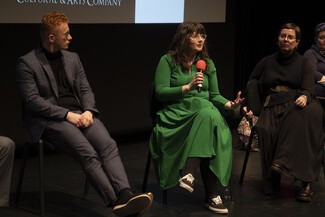
The report itself is extensive and features sections on supporting widening engagement and bringing equality and diversity into the arts and culture sectors. As less than 0.3% of national arts funding is allocated to GRT arts, this report emphasises methodologies to moving forward with an inclusive roadmap, advocating for direct commissioning from GRT artists and GRT-led organisations by those local and national organisations, groups and individuals with the power and funding to do so.
Dr Rosa Cisneros highlighted the report as an important Equality and Diversity planning tool; “The report is timely and extremely important for EDI-related work and for the wider Arts and Cultural Heritage sector. I hope more organisations will read, use the roadmap and not be passive. This report is inclusive of many GRT voices of many community members.”
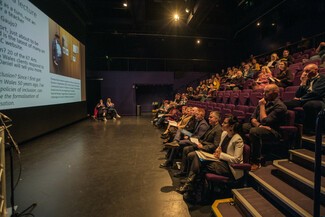
Thinking about future progress, Dr Jo Clement concluded; “It is my hope that through effective and ambitious initiatives like the Romani Cultural and Arts Company, we can help the Arts Council deliver on its commitment to achieving equality in Wales. Romani Cultural and Arts Company delivers the highest quality Gypsy, Roma and Traveller-led creative learning and programming. Building from this report, they can only continue to make positive changes through extensive investment, which will help make space for our 'invisible minority' to express ourselves, both to and for future generations.”
Romani Cultural & Arts Company Sites of Inclusion Report;
Imogen Bright Moon/ TT News
(lead photo: Dr Rosa Cisneros © Felix Page)